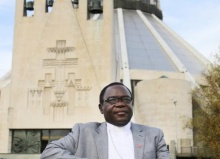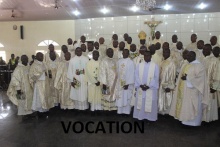YAOUNDÉ, Cameroon - For decades Nigerian migrants have left their country - both legally and illegally - hoping to escape poverty, conflict, and corruption.
Those traveling without proper documents faced several risks, including hunger and thirst, robbery, and the dangers of sea crossings into Europe. If caught, Nigerian migrants can be detained and eventually deported from their destination or transit countries.
The Bishop of Sokoto, Matthew Hassan Kukah, told Crux that migration is “the ultimate manifestation of our state of despair.”
The bishop said the story of Africa is the story of a very irresponsible elite that has shown no commitment to redeeming its people.
“It is difficult not to cover our faces in shame because we can find no explanation for the lack of commitment to ridding our people of hunger, illiteracy, destitution and despair. Our successive leaders have stashed our resources abroad and reduced us to the state we are in now,” he said.
At the same time, while not commenting on the specifics of the United States, Kukah said a border wall - like that endorsed by President Donald Trump - would be a good idea for Nigeria.
“For me as a Nigerian, I would gladly recommend walls especially for the northern parts of Nigeria where thousands of murderers, bandits and outlaws have invaded and claimed the lives of hundreds of citizens, destroyed hundreds of communities and so on,” the bishop told Crux.
“To be sure, bridges are better than walls, but countries will have to make policies that protect their people. Walls may not necessarily mean that no one should come in, it is just that countries should be free to regulate immigration. In the process, human dignity must be guaranteed while the rights to immigrants are duly respected,” Kukah said.
The following are excerpts of his conversation with Crux.
Crux: In Europe, Africa is usually talked about in terms of people fleeing conflict, poverty, and poor governance to the so-called greener pastures in Europe and America, or other countries. Is there nothing positive about Africa to keep people home?
Kukah: Well, it is not the duty of Africa to create an African narrative. One of the saddest things about us as Africans is that we have not been able to create our own positive image of ourselves. The titles of our novels - Cry the Beloved Country, The Famished Road, Things Fall Apart, House of Hunger, etc - all suggest that even we ourselves remain so thoroughly cynical about ourselves.
The tragic story of Africa is the story of a very irresponsible elite that has shown no commitment to redeeming its people. It is difficult not to cover our faces in shame because we can find no explanation for the lack of commitment to ridding our people of hunger, illiteracy, destitution and despair. Our successive leaders have stashed our resources abroad and reduced us to the state we are in now.
So, it is difficult to blame those seeking for greener pastures. For the average African fleeing, everywhere and anywhere is definitely better than their present homes. Whatever is positive about Africa has been consumed by the locusts and no matter how much we try; everything is there for the world to see.
What do you think should be the right priorities when it comes to managing the phenomenon of migration? Should the focus be on saying people have a right to migrate and should be accommodated, or should focus be on creating the enabling environment for people to stay in their home countries?
I think Cardinal Robert Sarah [the Guinean head of the Vatican’s liturgy department] made a comment about this, telling Africans not to be seduced by the trappings of Europe. I do not think that the issues are cut-and-dried because people are really suffering and they are visibly unsafe and living between life and death every day.
No one can romanticize migration with all its dangers, but it is the ultimate manifestation of our state of despair. People will never stay in their own country. Movement is part of life. The colonialists did not stay in their countries; they came in search of something, including those who came to preach the word of God. On its own, migration was never necessarily a negative thing.
The saddest thing for us in Africa is that we are migrating without a vision, unlike the Asians for example. Many countries are doing their best to ensure that things change, but our continent is riddled with so much corruption that our leaders, bureaucrats and public servants are stealing even from the mouths of the dying. It is sad and really heart-breaking because things should not be the way they are.
Look at the unacceptable lifestyles of our leaders. In Nigeria for example, someone has done an analysis and concluded that just half of the salary of the 360 Members of the Federal House of Representatives in Nigeria - each receives 25 million Niara (nearly $70,000) a month - can create jobs for almost 50,000 people, pegging the salary at 92,000 Naira! This is in a country where the federal and state governments are still unwilling to pay the 30,000 Naira minimum wage!
Do you think African leaders have been handling this phenomenon the right way?
I don’t think so. Our very corrupt leaders must outsource the duties of feeding, employment and looking after their citizens to other nations. It is their selfish and divisive leadership styles that have made it impossible for even the most resource-endowed nations like Nigeria, South Africa, Democratic Republic of Congo and others to grow. They are not doing enough to protect their people and I wonder what they discuss when they have all these many meetings and conferences.
The U.S. President, Donald Trump has made it a policy to build walls to stop the flow of migrants. Pope Francis says bridges should be built. Which, to your mind is the right policy option?
I have no comment about the United States but for me as a Nigerian, I would gladly recommend walls especially for the northern parts of Nigeria where thousands of murderers, bandits and outlaws have invaded and claimed the lives of hundreds of citizens, destroyed hundreds of communities and so on.
To be sure, bridges are better than walls, but countries will have to make policies that protect their people. Walls may not necessarily mean that no one should come in, it is just that countries should be free to regulate immigration. In the process, human dignity must be guaranteed while the rights of immigrants are duly respected.


